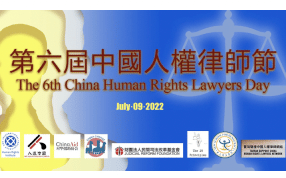IAPL
This memorandum provides an overview of Human Rights Watch’s central concerns with respect to the Chinese government’s human rights practices, submitted to the United Nations Human Rights Committee (the “Committee”) in advance of its review of China (Hong Kong) at its 135th session in June/July 2022. This submission, which draws on years of research and documentation by Human Rights Watch, covers the authorities’ misuse of national security legislation, severe restrictions on freedom of the media, and pressure on a once-independent judiciary, among other issues. We hope it will inform the Committee’s assessment of the Chinese government’s compliance with the International Covenant on Civil and Political Rights (ICCPR).
CHRD is hosting a Twitter Space on #HongKong!
July 1st will mark the 25th anniversary of the handover, 2nd anniversary of the National Security Law, and inauguration of the new CE John Lee.
The UN Human Rights Committee will also soon review HK's compliance with the (ICCPR).
— CHRD????? (@CHRDnet) June 29, 2022
[…]
Access to justice, independence of the judiciary and the right to a fair trial (arts. 2 and 14)
The Chinese government has stepped up pressure on Hong Kong’s independent judiciary, expressing anger at judges’ performance, especially in handling cases related to the 2019 protests. Beijing-controlled newspapers Wen Wei Po and Ta Kung Pao have run articles and opinion pieces that repeatedly named and attacked judges whom they accused of being biased towards the pro-democracy movement, criticizing them when they question police or prosecution evidence, or when they hand down sentences Beijing considers too lenient. These media outlets have called for such judges to be punished for “encouraging chaos on the streets.”
In November 2020, the Hong Kong Bar Association wrote to Secretary for Justice Teresa Cheng, calling on her to “defend the judiciary and individual judges against these pernicious accusations,” which it says, “hover on the margins of a contempt of court.” Cheng is not known to have taken any actions to protect judges.
The 6th #ChinaHumanRightsLawyersDay
July 9th, 9:00-11:30am EST
Livestreaming https://t.co/ItoOYvfU2b
Opening remarks by @CECCgov Chair @SenJeffMerkley
Participants: EU & Canada lawmakers, Chinese lawyers, @ABAesq Prez Reginald Turner, Prof Andrew Nathan, speakers from int'l bars pic.twitter.com/Vly1PHgnMN— Yaxue Cao (@YaxueCao) June 30, 2022
Beijing’s newspapers and pro-Beijing politicians have also attacked the bar association’s then chairperson, Paul Harris, who had called on the government to revise the NSL so that it is consistent with the Basic Law. The papers called Harris “an anti-China politician,” and baselessly linked the organization he co-founded, Hong Kong Human Rights Monitor, with US intelligence agencies. Beijing’s representative office directly called for Harris’ resignation in April 2021??. They have also threatened to take away the bar association’s statutory powers, including those to certify barristers, which would have serious consequences for lawyers’ independence. Harris did not seek re-election, and after the NSL police summoned him, he left Hong Kong abruptly in March 2022.
In April 2022, another prominent human rights lawyer, Michael Vidler, also closed his law firm of 19 years and left Hong Kong, though without giving an explanation.
[…]




